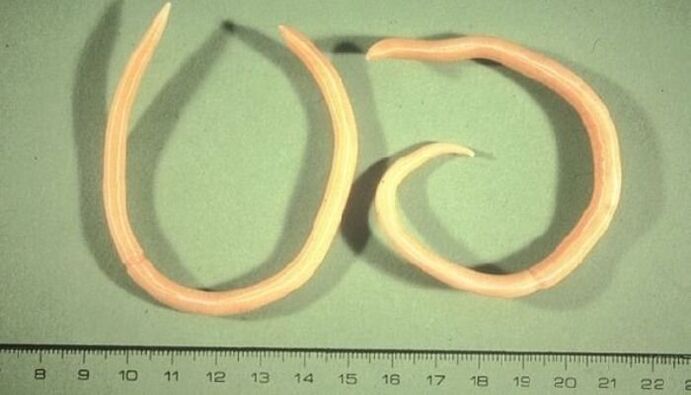
Helminthiasis is one of the most unpleasant and worst diseases. Parasites live in the human body, poison the body and cause chronic diseases. You can get sick for years without you knowing - this stage of helminthiasis is called an aborted course.
Because worms cannot be completely prevented from entering the body, the symptoms they cause must be known not only in childhood but also in adulthood.
First symptoms
The main danger of the disease in the first stage is that it is quite difficult to detect parasites. The symptoms often coincide with the causes of other diseases.If you notice the following feelings and signs, we recommend that you examine the helminths:
- unjustified temperature rise;
- the lymph nodes are unusually enlarged;
- aching pain in the muscle tissues and aching pain in the joints;
- teeth and skin turn yellow;
- anal itching;
- increased appetite;
- occasionally rashes appear on the skin;
- swelling in the legs, arms and fingers;
- diarrhea;
- abdominal pain and gas;
- bitter taste in the mouth;
- frequent snoring;
- insomnia or restless sleep.
Similar symptoms indicate an invasion with a 70% probability. See a doctor immediately and test for the presence of parasites.
Important!Even if a medical examination of the stool and blood did not show the presence of worms, you should still drink the medications recommended by your doctor. Analyzes are not always able to detect helminth samples for the first time.
Intestines
The gastrointestinal tract is the main habitat of parasites, although they can spread to any internal organ. By knowing what the symptoms are, you can successfully narrow down the list of helminth species that have settled in your body. What signs are worms in the gastrointestinal tract?
- One of the symptoms is joint and muscle pain.
- Feverish condition.
- Weakened immunity and the development of various diseases of the gastrointestinal tract.
- The total number of eosinophils (a subspecies of white blood cells) in the blood increases.
- Allergic reactions occur.
Tapeworms cause manifestations like nematodes.If you find such signs, you should consult a doctor and perform a comprehensive test to detect different types of parasites.

Lungs
No less dangerous are the parasites that have settled in the respiratory system. In some species, the developmental cycle necessarily involves the passage of larvae through the host lungs. They are then returned to the intestines when swallowed orally.Possible signs:
- Chest pain and tingling first appear.
- It will be difficult to breathe: a person will be accompanied by shortness of breath and suffocation.
- The uncomfortable and debilitated condition of the whole body is caused by infection of the lungs with parasites.
- Body temperature rises rapidly.
- In the morning, the patient wakes up from seizures.
- There are problems with the visual organs.
- The person has an extensive allergy.
- Infected people lose their appetite. There are signs of poisoning with toxins.
- Increased headache.
- Vomiting and nausea.
Liver
In the largest human gland, which performs many important functions, worms also colonize. They disrupt your work, causing dangerous illnesses.The following manifestations may occur:
- Due to the activity of the parasites, anemia develops. The concentration of hemoglobin and the total volume of erythrocytes decrease. Attention is not focused. The patient's skin will be pale and quickly get tired of any activity.
- The chair is liquid.
- Symptoms include swelling and itching.
- The whole body hurts.
- The patient has a fever and begins to lose weight quickly.
- A person infected with worms is constantly ill and vomiting.
- Appetite deteriorates significantly.
- The liver seems to have gotten bigger.
- Severe hives.
- The patient looks sick.
Important!In advanced cases, parasites in the liver lead to nervous system disorders, duodenal ulcers, irritability, headaches, and other dangerous consequences.

Eyes or brain
Worms that have chosen to inhabit the visual organs and the brain pose an extreme threat to human life and health. Early diagnosis of parasites at these sites avoids brain damage and blindness.
- Eye damage is manifested as follows:
- Inflammation of the conjunctiva due to the larvae trapped inside it.
- The eyelids swell like germination.
- The patient feels some movement in his eyes.
- Dilated ornate lines appear on the skin of the eyelids.
- Conjunctivitis is a consequence of infection of the visual organs by parasites.
- Brain damage is expressed as:
- Nervous tension and collapses.
- Sleep problems that lead to constant insomnia.
- Drinking alcohol has become difficult. Drinking strong drinks causes severe headaches.
- The back of the head and the temple are the main sites of pain.
- Depression does not go away, it only gets worse.
- During a headache, the person infected with the parasite is constantly ill, wanting to vomit.
- Suddenly, eye problems occur.
Only a qualified doctor can make an accurate diagnosis. In addition to therapeutic and hospital examinations, the patient is advised to consult laboratories that specialize in diagnosing parasites whenever possible.
The most common symptoms
Many signs of infection are common in most tapeworms or tapeworms. Once the main consequences have been identified, it is advisable to proceed to identify a particular type of parasite for effective treatment with the appropriate drug. Possible symptoms of helminthiasis:
- The rash is one of the main signs of parasite invasion. There may be common pimples, chiria, papillomas, hives or eczema spots.
- Chronic cough does not go away after taking antibiotics and expectorants.
- Decreased immunity does not allow the patient to get out of the constant cold state.
- The movement of worms in the body causes severe joint pain.
- Blockade of large intestinal worms in the rectum, pancreas, and gallbladder is manifested by constipation and bloating.
- Increased nerve activity causes gnashing of teeth.
- Problems with the work of the gastrointestinal tract cause irritability.
- Inflammation of the upper respiratory tract is accompanied by runny nose, pneumonia and other diseases. Such symptoms are particularly common in strongyloidiasis (intestinal acne) and ascariasis (tapeworm).
- Poisoning caused by products of metabolic disorders and worm activity causes a chronic depressive state.
The symptoms allow the experienced therapist to distinguish parasitic infection from diseases with similar symptoms. In the active phase of reproduction, the diagnosis is clarified by means of tests.

Symptoms of infection in children
Helminths are very dangerous to younger members of the human race. Timely detection of parasites in children is essential for their healthy development. Sometimes the signs of worms in a child’s body appear to be quite harmless, so parents need to be extremely careful.
- If your baby is snoring in his sleep and sleeping poorly, think about the presence of needles in the fragile body. They affect brain tissue, causing nerve reactions.
- Common and local manifestations of an allergic reaction are also characteristic of invasion. Giardia causes the following common reactions: nail cracks, bronchial asthma, rhinitis. Local reactions include signs of itching, dry cough and asthmatic cramps.
- In children, the consequences of a weakened immune system are inflammation of the sinuses (sinusitis), changes in the lining of the mouth (stomatitis), inflammatory processes in the female organs (vulvovaginitis) and bacterial vaginosis.
- Ascariasis and diphyllobothriasis (broad tapeworms) cause aggression and irritability in children. This is due to poisoning of the brain with helminth waste.
- Hormones produced by certain types of parasitic worms cause fluid absorption disorders in the gastrointestinal tract. This leads to stool disturbance and diarrhea.
If someone has worms, what symptoms can be experienced regardless of age? From depression and allergies to severe diseases of the internal organs, brain and nervous system disorders.Children are particularly sensitive to the negative effects of parasites.In infants, chronic poisoning with toxic waste products from various worms causes mental disorders and developmental delays.
The first symptoms should be an alarming need for an urgent diagnosis and appropriate treatment of the disease. After freeing the body from the presence of helminths in time, the patient soon recovers and the joy of life returns.
Timely medical consultation will help determine the exact type of helminths that precisely prescribe effective treatment procedures.
























